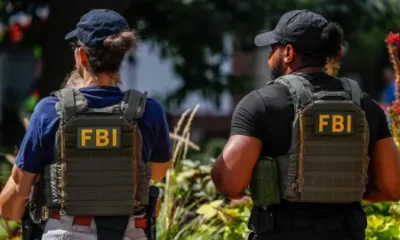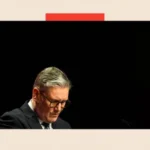Business
How much trouble is Labour in – and is the PM the right man for the job?
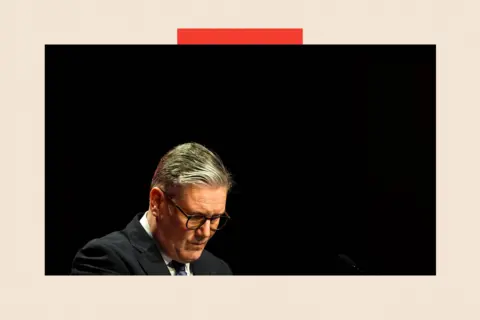
Read full article on post.
 Laura KuenssbergPresenter, Sunday with Laura Kuenssberg
Laura KuenssbergPresenter, Sunday with Laura Kuenssberg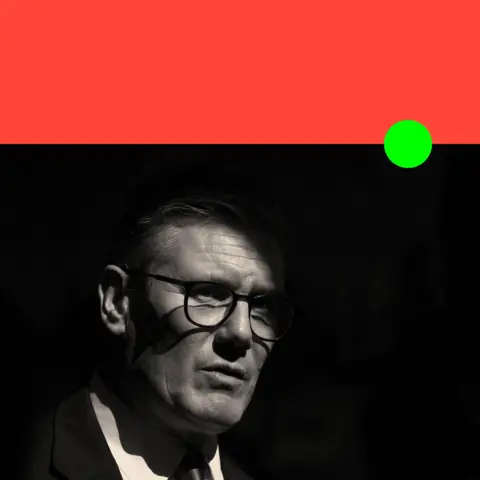 BBC
BBCSir Keir Starmer achieved what many sage minds in Westminster believed was impossible.
Labour smashed itself to bits in 2019. But Sir Keir put the party back together and swept back to power with an epic majority five years later.
Yet, turn on the radio or glance at the headlines and Labour appears to be flirting with the unthinkable – giving him his P45.
In the last few days I’ve spoken to 30 people across government and the party – ministers, MPs, advisers – to try to work out, as the prime minister makes his way to Labour’s annual party conference in Liverpool, how much trouble is he really in?
“How many more data points do you need to see that he is just not very good at being prime minister?”
Unforgiving as that sounds, the Whitehall figure who posed that question is far from the only person who has seen Starmer’s government up close to conclude that fundamentally, the prime minister is just not suited to many aspects of the job.
For months polling has suggested the public feels the same.
Sir Keir is an intelligent, incredibly diligent, serious-minded politician who has achieved extraordinary things. But time and again the same problems are raised, summed up brutally by another senior figure: “His judgement on people has proven to be flawed, see endless staffing resets.”
“His judgement on policy is flawed, hence U-turns, and he can’t communicate, and has been unpopular in the public’s eyes for a long time.”
Others point to a slow pace of decision making in Downing Street, suggesting the prime minister thinks “too like a chairman, not a chief executive,” says another insider.
And “he only gets to the right answer having exhausted all the other options,” rather than moving fast using a gut political instinct.
Another senior party figure says: “He doesn’t think like a leader.”
Everyone in the Labour party is fed up with months of shocking polls.
But others are fed up of colleagues complaining about the boss, whether the small number who do so in public, or the much higher number who do so in private.
“It’s like being England manager,” one cabinet minister jokes. “Everyone thinks they can do a better job.”
You can hear the frustration in others’ voices, highlighting the “outstanding job” Starmer has done on the world stage – wrangling President Donald Trump, or leading support for Ukraine.
“He hasn’t put a foot wrong,” when it comes to foreign policy, says a cabinet minister.
Another praises the “sensible changes” the prime minister has just made to Downing Street, saying “people now are now in jobs that will suit their abilities better” after the reshuffle, and promising the public will soon see the benefit.
There can be no hiding from a very messy few weeks, with the forced exits of Angela Rayner and Lord Mandelson, and the circus around the Mayor of Greater Manchester Andy Burnham’s not very hidden ambition.
But there are other believers in what they see as Starmer’s steady and relentless leadership, as one party source jokes: “There were a couple of weeks where we couldn’t get of bed without accidentally tearing our own arms off.”
They predict “that could all go away if we have a decent couple of months”.
Perhaps. What even some of the prime minister’s staunchest allies believe is that, he must explain more clearly, and vigorously, to the party – and to all of us – what the government is actually doing and why.
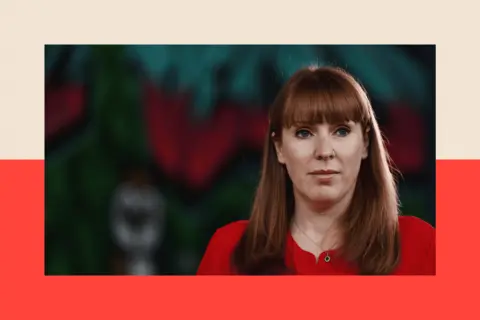 Getty Images
Getty ImagesSir Keir himself admitted as much in the summer, saying: “We haven’t always told our story as well as we should.”
So in the next few days, and live on the programme tomorrow, expect the prime minister to try hard to make a clearer pitch to the country. After a horrible few weeks, aides say the prime minister is in a “better place, clearer about the argument he wants to make”.
Announcements like the Hillsborough Law, the returns deal with France, and yesterday’s confirmation that ministers will go ahead with digital ID cards will convey, No 10 hopes, a sense of momentum.
And you can expect him to build on the argument he’s been making about patriotism in politics, trying to reclaim some of the territory Reform UK have been trying to grab.
There are two problems though.
Firstly, even Starmer’s biggest fans in government know fluid communication is not his strong point. He doesn’t see the camera, or the TV sofa as his friend.
A strong defender of Starmer tells me: “I wish he was better at telling a story, people don’t understand how deeply he feels it and how passionate he is, but he personally isn’t good at it.”
Secondly, and according to one senior MP this is the bigger issue: “We’re just not clear about what we are doing or who we are for.”
Another staffer tells me: “There is no fire, no passion, no vision – we are timid and flat-footed.”
Even if the prime minister suddenly developed the silky charm and persuasiveness of George Clooney, or the bombastic nature of Piers Morgan, the question becomes, what is the story he wants to tell?
Multiple exits from the No 10 communications team tell you that working this out is not an easy task.
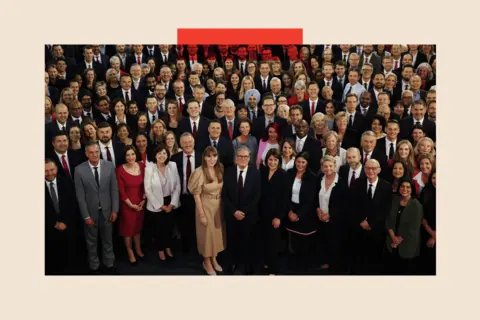 Getty Images
Getty ImagesOne source says: “Until we know the story we are trying to tell we will get buffeted around.”
Is reforming schools, hospitals or welfare at the top of the list? Building houses or becoming a green “superpower”? Or being at the forefront of technology, or protecting our borders, or growing the economy? Or is it now this priority of “patriotic renewal”?
If you have that many priorities, how can the public understand what you care about most? To govern is to choose after all, if you’re not doing much choosing, are you doing much governing?
One source suggested frankly, even for those who work closely alongside him, it’s often hard to work out what the prime minister thinks, telling me: “He often appears unknowable.”
“He compartmentalises his life – personal, professional, and political – in a way that works for him, but leaves colleagues unsure of his true views.”
In a sense it seems extraordinary that the leader of a political party can leave colleagues unsure of their views, after 14 months in office, and four years as leader in opposition.
But his early years in charge were dominated by internal fights for control of the party, and over antisemitism, not over ideas.
One source recalls: “We had lots of fights to win in opposition, but they were never, ever about what the parties’ priorities should be.”
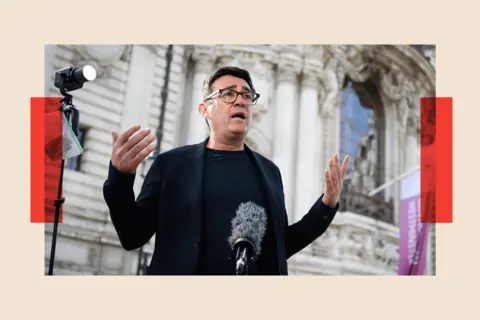 Getty Images
Getty ImagesThe prime minister has a huge chance in the next few days to spell out to his party, and to the public, exactly where he stands, and exactly what he believes in specific terms.
After a horrible summer, and a very tricky year, it is desperately needed if the party is to get back on track.
“There is a way through this, but he has to assert himself,” says one cabinet minister, desperate for the prime minister to remind his party and the country why they elected him in the first place.
Ministers and Downing Street are frustrated by chatter about Starmer’s leadership, especially the behaviour of Andy Burnahm in recent days.
“Everyone needs to just shut up and get on with their own jobs,” one government source says.
Another says: “the Burnham stuff is just ridiculous.”
“He doesn’t have a seat in Parliament, wouldn’t necessarily find or win one,” and one minister snipes, “any chance to have a dig – Burnham will never miss an opportunity”.
They predict confidently, the party “doesn’t want regicide or disruption, they just want us to do well”.
But leadership chatter is a symbol that all is not well. And that sense of assurance is far from universal.
One senior figure outside government warns me, “they don’t realise they are in serious, serious trouble – this is literally a head-in-hands-moment”.
There are real discussions in different pockets of the Labour movement about whether Starmer should still lead the party.
And the sweaty bars and fringe meetings of the party conference provide the perfect backdrop for those out to make trouble.
Yet it’s clear from multiple conversations that it’s not only mischief makers who are pondering what to do.
“Frustration is wide and deep,” says a senior MP.
One insider who has been part of conversations about the chances of changing the leader says, “it’s not flighty people, not just newbies without a clue, they’re not idiots”.
Even on the government payroll one minister worries, “the country is desperate for a disrupter, and it’s just not who he is,” questioning whether Starmer can be the right man for this political moment.
Here’s the fundamental question, asked by many, expressed by one senior figure: “Do we think Keir can improve? People don’t think he can, although they wish he would. But there is a sinking feeling.”

Sign up for the Off Air with Laura K newsletter to get Laura Kuenssberg’s expert insight and insider stories every week, emailed directly to you.

Some MPs are even pointing to the example of the Democrats’ failure to tell former President Joe Biden to go, which left the party no time to build up another candidate.
The source continues we “dread and fear being the people who didn’t do what was necessary to stop the country electing Farage”.
Others would baulk at that comparison. The prime minister has only had just over a year in charge. The problems Labour inherited on taking office were profound.
Centre left political parties in many countries are grappling with how to deal with demographics, immigration, an era where public money is very tight.
There are more than three years until the next general election. There is time to start wrestling with all of that.
The electorate has shown politicians they can move in droves, and fast. So many ministers plead for patience.
One wishes his colleagues would not just “get a grip”, but remember they were all elected on a promise to stop political chaos.
“Anyone who thinks the challenging world is rectified by a change in leader, I don’t understand the rationale. When we look at how unstable things are, and talk about leadership, how would the bond markets respond, when our primary responsibility is stabilising the economy?”
Another source dismisses those predicting doom in the party, “nothing is irrevocable, and nothing is inevitable”.
Perhaps the rebooted No 10 will start getting better results.
Perhaps, and No 10 fervently hopes, Sir Keir will wow the crowds at conference, and display why he earned the job to start with, and won the election in the first place.
The prime minister’s position is also, frankly, protected by the fact there is no consensus about who could do a better job than him.
Even if Labour were to conclude universally, which it is far from doing, that Starmer’s leadership is somehow beyond repair, that reality is a smack in the face for those who’d seek a change.
As one Whitehall figure suggests: “problem one, is he good at being PM? No. But next problem, do you have an upgrade? Hmm…”
Labour’s answer to that question right now, notwithstanding Andy Burnham’s antics, is, “well, we’re not sure”.
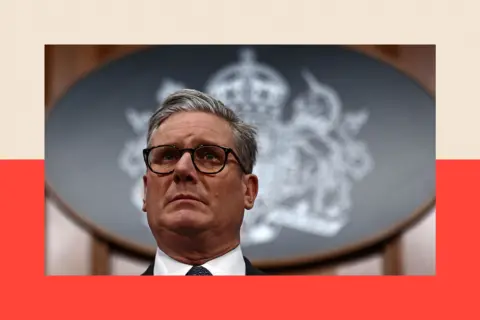 AFP via Getty Images
AFP via Getty ImagesA lack of clarity over who would be next, and fresh memories of the political shambles of the Conservatives’ change of leader, both put the brakes on anyone seeking to make a change any time soon.
As ever in politics two things that might appear to be contradictory are in fact, both true.
Is it mad on paper for Labour to be even vaguely contemplating changing their leader so soon, without an obvious strong successor, when they ran on a promise of no drama? For many, yes, it’s crackers.
But is the discussion about whether the PM can carry on like this just idle chit-chat? Not at all.
One senior figure sums up the situation with no pleasure – discussion about changing the Labour leader “is both lunatic, and real”.
The leadership’s hope is that a strong conference without too many noises off, and an effective speech from the platform by the prime minister himself might calm everything down.
A political get together, a party conference for the politicians, members, and associated hangers-on, would never transform a prime minister’s fortunes with the public overnight. But it can make a big difference to how a party feels about itself.
For Starmer to have a chance of restoring his position with the public he must first, once again, persuade his party that he is the man for the job.
But without restoring his party’s faith in him, convincing Labour of his merits, his own position could well be at risk.
One insider who knows the prime minister well suggested: “He is not a natural explainer… he states positions but doesn’t repeatedly argue for them.
“This has led to an aversion to debate, treating persuasion as weakness.”
Yet politics is, above all else, the art of persuasion. That is perhaps the dilemma for Labour. That is the problem for him.
BBC InDepth is the home on the website and app for the best analysis, with fresh perspectives that challenge assumptions and deep reporting on the biggest issues of the day. And we showcase thought-provoking content from across BBC Sounds and iPlayer too. You can send us your feedback on the InDepth section by clicking on the button below.
Business
Harry says people trying to sabotage reconciliation with King
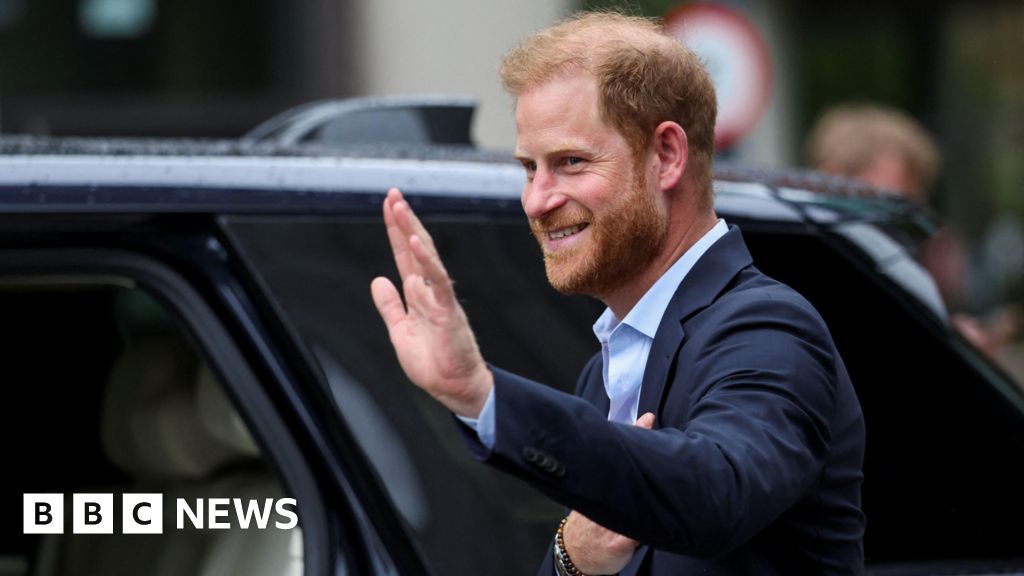
Read full article on post.
The Duke of Sussex has suggested people are trying to sabotage his reconciliation with King Charles, as he described media reports about their recent meeting as “categorically false”.
Prince Harry met his father at Clarence House in London on 10 September, in their first face to face meeting since February 2024.
However a report in the Sun on Saturday suggested the reunion had been more formal than expected, with the duke reportedly left feeling like he was being treated as an official visitor, rather than family.
In a statement, Prince Harry’s spokesperson said the claims were “pure invention fed, one can only assume, by sources intent on sabotaging any reconciliation between father and son”.
The spokesperson did not elaborate on who the sources may be. The Sun newspaper has been approached for comment.
The duke’s recent visit to the United Kingdom took place over four days, during which he carried out a series of charity events in Nottingham and London.
Almost two years had passed since father and son last saw each other, with their last engagement together taking place soon after the King’s cancer diagnosis last year.
Prince Harry, 41, has visited the country in the meantime for other engagements, including court appearances.
Buckingham Palace confirmed that the pair had a private tea together during a visit that lasted about 50 minutes.
The meeting was seen to be the first step in improving relations between the King, 76, and the duke following what has seemed a deep family rift.
Prince Harry has previously told BBC News he did not want to fight anymore, saying in an interview in May: “I would love a reconciliation with my family.”
In his statement on Saturday, Prince Harry also corrected part of the Sun’s report about the gifts that had been exchanged. The Sun had initially said a framed photograph of the Duke and Duchess of Sussex’s family was exchanged.
“While we would have preferred such details to remain private, for the sake of clarity we can confirm that a framed photograph was handed over, however the image did not contain the duke and duchess,” the duke’s spokesperson said.
An earlier statement from a spokesman for the duke to the Sun read: “The trip back was about focusing on his patronages and supporting his good causes while also having time to catch up with family and friends.”
Prince Harry has previously expressed his desire to reconcile with his family after years of media appearances, a memoir and a Netflix documentary that have caused further strain and speculation.
Prince Harry, Meghan and their two children, Archie and Lilibet currently live in California. The last known meeting between King Charles and his grandchildren was at the late Queen Elizabeth II’s Platinum Jubilee in June 2022.
There have been no signs of Prince Harry and his brother Prince William meeting in the future, with the brothers carrying out separate arrangements during Prince Harry’s visit.
Prince Harry has long been critical of parts of the UK media, and brought legal action against several newspapers including the Sun. In January, the publisher of the Sun agreed to pay “substantial damages” and apologised to the Duke of Sussex to settle a long-running legal battle over claims of unlawful intrusion into his life.
Last year, he said the tabloid press had been “central” to the breakdown of his relationship with the rest of the Royal Family.
Business
Nuno set for West Ham job after Potter sacked
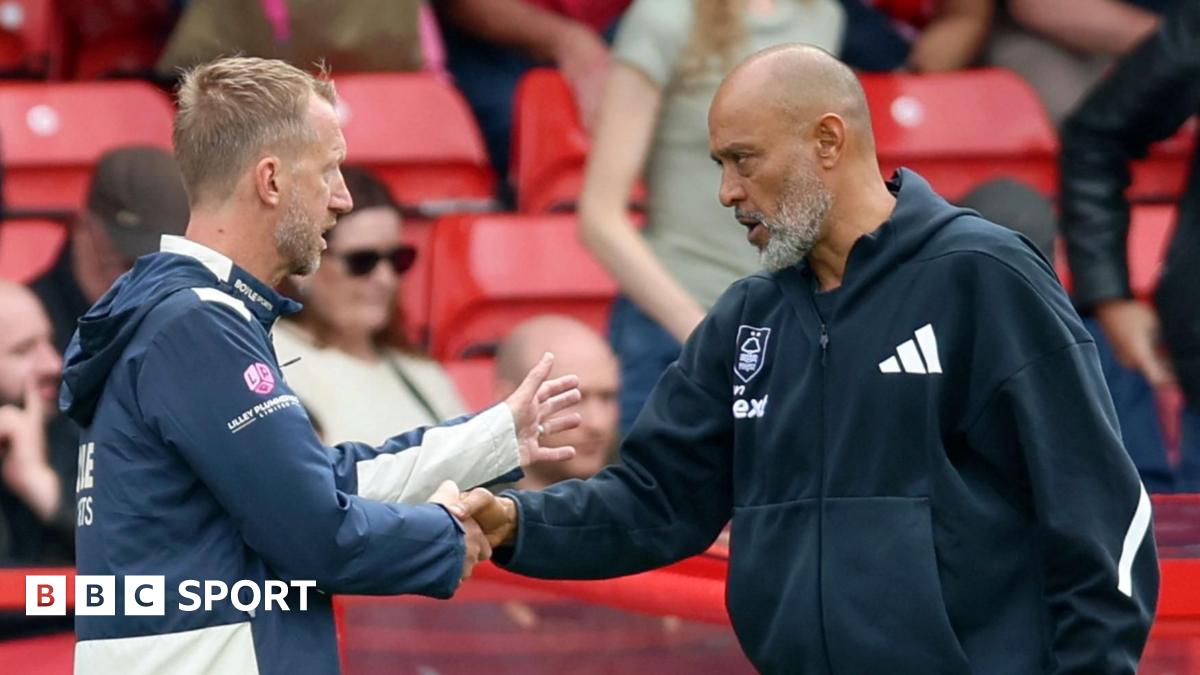
Read full article on post.
To play this video you need to enable JavaScript in your browser.
This video can not be played
-
27 September 2025, 10:42 BST
West Ham are set to appoint former Nottingham Forest manager Nuno Espirito Santo as head coach after sacking Graham Potter.
Nuno is expected to be in place before Monday’s Premier League match against Everton, having said he has had positive talks with the West Ham board.
Potter was dismissed on Saturday morning after only eight months in charge, with the club 19th in the table.
The Hammers took only three points from their opening five league games this season under Potter.
West Ham said they believed “a change is necessary in order to help improve the team’s position in the Premier League as soon as possible”.
They added: “Results and performances over the course of the second half of last season and the start of the 2025-26 season have not matched expectations.”
In a statement via the League Managers Association, Potter said: “I am incredibly disappointed to be leaving West Ham, particularly without being able to achieve what we set out to achieve at the start of our journey in East London.
“I do, however, fully acknowledge that the results have just not been good enough up to now.”
Potter, 50, had been preparing for Monday’s game and fulfilled his media duties on Friday, saying he believed he had the board’s backing after “positive talks”.
After last Saturday’s home defeat by Crystal Palace, BBC Sport reported that West Ham were considering managerial alternatives, and discussions with Nuno have accelerated over the past 72 hours.
Nuno, 51, was sacked after 21 months in charge at Forest – and only three games into this season.
Last term the Portuguese guided them to seventh in the table – their highest finish since 1994-95 – as they qualified for Europe for the first time in three decades.
Potter took charge of 25 West Ham matches after being appointed in January – winning six – and they finished 14th last season.
“The board would like to thank Graham and his coaching staff for their hard work during their time with the Hammers and wish them every success for the future,” West Ham said.
“The process of appointing a replacement is under way. The club will be making no further comment at this time.”
Former Wales captain Ashley Williams told BBC’s Football Focus: “For the West Ham fans and the club, they want to see a hard-working team and a bit more bravery in possession.
“Under Potter, it was flat – there was nothing for the fans to get behind. Nuno can galvanise the club and he is the perfect person of the available managers to put in there.
“West Ham have been so easy to play against. You only have to get out of second gear to beat them.
“Nuno will organise his team and figure out what players he wants and what players he can work with.”
What went wrong for Potter?
The 2-1 defeat by Palace was West Ham’s fifth in six league and cup games this season.
Potter replaced Julen Lopetegui, who was sacked in January after six months in charge when West Ham were 14th in the table.
But former Chelsea and Brighton boss Potter found wins difficult to come by.
West Ham, who sold Ghana forward Mohammed Kudus to Tottenham for £55m in July, spent £126m on eight signings in the summer, including the £38m purchase of Portuguese midfielder Mateus Fernandes from Southampton.
But losses to Sunderland, Chelsea, Tottenham and Palace left them in the bottom three. They went out of the Carabao Cup in the second round with a 3-2 defeat by fellow strugglers Wolves.
That led to West Ham issuing a statement acknowledging “results and performances on the pitch over the past two seasons have not met the standards we set for ourselves”.
Disgruntled fans staged a demonstration against the board before the Palace match.
Poor results led to Potter becoming a viral trend on social media, with people using AI technology to swap his face on to other celebrities, including Barbie, US President Donald Trump and the Chuckle Brothers.
Speaking on Friday, Potter said he had not been taking it too seriously.
“It made my 15-year-old son laugh a lot, so you have to accept what comes with it,” he said.
“At times [that is] ridicule, but that is just the environment we are in and it is what it is.”
West Ham’s fortunes have declined since David Moyes’ departure a year after he won the club’s first trophy in 43 years in the Europa Conference League in 2023.
Potter’s arrival was supposed to herald a new brand of attractive football but the downward spiral has continued into this campaign.
How did Nuno’s spell at Forest finish?
Despite Forest’s success during Nuno’s time as manager, his relationship with owner Evangelos Marinakis deteriorated in his final few months at the club.
In August Nuno revealed he feared for his job, with internal tensions believed to centre around disagreements over their transfer business, which was conducted by new global head of football Edu.
Despite spending about £196m on 13 players, former Wolves and Tottenham coach Nuno criticised the activity in the summer transfer window, saying Forest had wasted a good chance.
Forest suffered a poor run of form towards the end of 2024-25, taking only eight points from their final eight matches to slide out of Champions League contention.
In May Marinakis appeared to confront Nuno on the pitch following a 2-2 draw against relegated Leicester, although Forest said there was “no confrontation” and it was “fake news” to suggest otherwise.
Forest started their season with a win over Brentford and a draw with Palace, before a 3-0 home defeat to the side he is now set to lead brought an end to his time in charge.
Related topics
Business
Drones seen over Danish military bases in latest air disruption
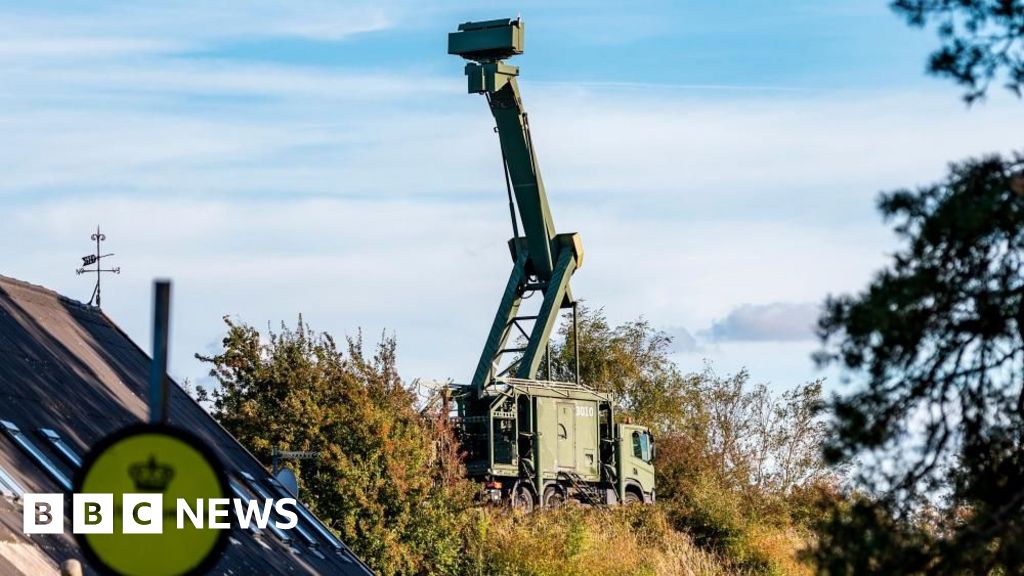
Read full article on post.
Drones have been seen near military facilities including Denmark’s largest, following a series of incidents that caused air disruption earlier this week.
The devices were observed above Karup airbase, among others, forcing it to briefly close its airspace to commercial traffic. Possible sightings were also reported in Germany, Norway and Lithuania.
It is the latest in a string of suspicious drone activity in Denmark, raising concerns about the nation’s vulnerability to aerial attack and sparking fears of potential Russian involvement.
Danish authorities said Thursday’s incursions appeared to be a “hybrid attack”, but cautioned that they had no evidence to suggest Moscow was behind it.
Friday’s incident took place around 20:15 local time (18:15 GMT) and lasted several hours, duty officer Simon Skelsjaer told news agency AFP.
He said police could not comment on where the drones had come from as they had not shot them down, adding that police were co-operating with the Danish military in their investigation.
Though civil airspace above the base was briefly closed, it had no impact because no commercial flights were scheduled in the area at the time, Skelsjaer said.
The Danish Defence Ministry confirmed that drones were sighted near multiple military installations overnight, but did not specify which ones. It said it would not comment further.
The other military installations have not been named by Danish state media.
Danish authorities have not speculated as to who might be behind the drone activity.
Some 3,500 people work at Karup airbase, which is home to all of the Danish Armed Forces’ helicopters, airspace surveillance and parts of the Danish Defence Command.
The incursions come just days after drones over Danish airports – some of which also housed military facilities – forced airports to shut down and close their airspace.
Denmark’s Aalborg and Billund airports closed due to drones above the airport on Wednesday night, while three smaller airports reported drone activity but were able to continue operating.
On Monday, Copenhagen airport closed for several hours after a number of drones were spotted, while possible drone sightings also temporarily shuttered Oslo airport in Norway.
Germany’s interior ministry said it was investigating after several drones were spotted on Friday over Schleswig-Holstein, the region that borders Jutland, the part of Denmark on the European mainland that is home to Karup airbase and the airports affected by Wednesday’s incursions.
Interior Minister Alexander Dobrindt said the threat from drones was high and that Germany would discuss the issue with European partners next month.
Meanwhile, Police in Norway told state media they were investigating possible drone sightings at Orland airbase, to the west of the country, where its F-35 fighter jets are stationed.
Drone activity also delayed flights on Friday at Vilnius airport in Lithuania, which shares a land border with Russian territory, according to state media.
There are suspicions that Wednesday’s wave of drone incursions may have been part of a Russian strategy of indirect aggression towards Nato states supporting Ukraine in its war with Russia – though this connection has not been proven.
The Russian embassy in Copenhagen has denied “absurd speculations” of its involvement in what it described as “staged provocations”.
Denmark’s defence minister said the “hybrid attack” was the work of a “professional actor” but appeared to have been launched locally.
A hybrid attack uses a mix of military and non-military tactics and is designed to interfere with a nation’s infrastructure or institutions.
Russia has been accused of conducting hybrid attacks in the past, and Europe has been on high alert after several Nato member states reported Russian incursions in their airspaces.
Estonia and Poland requested a consultation with other Nato members last week, after around 20 Russian drones crossed into Poland and Russian MiG31 jets entered Estonian airspace in separate incidents.
Romania, another Nato member, also said a Russian drone had breached its airspace.
Russia did not comment on the incident in Romania, but it denied violating Estonia’s airspace and it said the Polish incursion was not deliberate.
After Monday’s incident in Copenhagen, Danish Prime Minister Mette Frederiksen said Russian involvement could not be ruled out.
Kremlin spokesman Dmitry Peskov has called the allegations “unfounded”.
-
Politics4 days ago
European Parliament snubs Orbán with vote to shield Italian MEP from Hungarian arrest
-
Culture2 months ago
Fatal, flashy and indecent – the movies of Adrian Lyne revisited
-
Culture3 weeks ago
Life, loss, fame & family – the IFI Documentary Festival in focus
-
Environment1 week ago
Key oceans treaty crosses threshold to come into force
-
Health5 days ago
EU renews support for WHO’s Universal Health Coverage Partnership
-
Culture1 week ago
Farewell, Sundance – how Robert Redford changed cinema forever
-
Culture4 days ago
Twilight at 20: the many afterlives of Stephenie Meyer’s vampires
-
Culture4 weeks ago
What is KPop Demon Hunters, and why is everyone talking about it?











